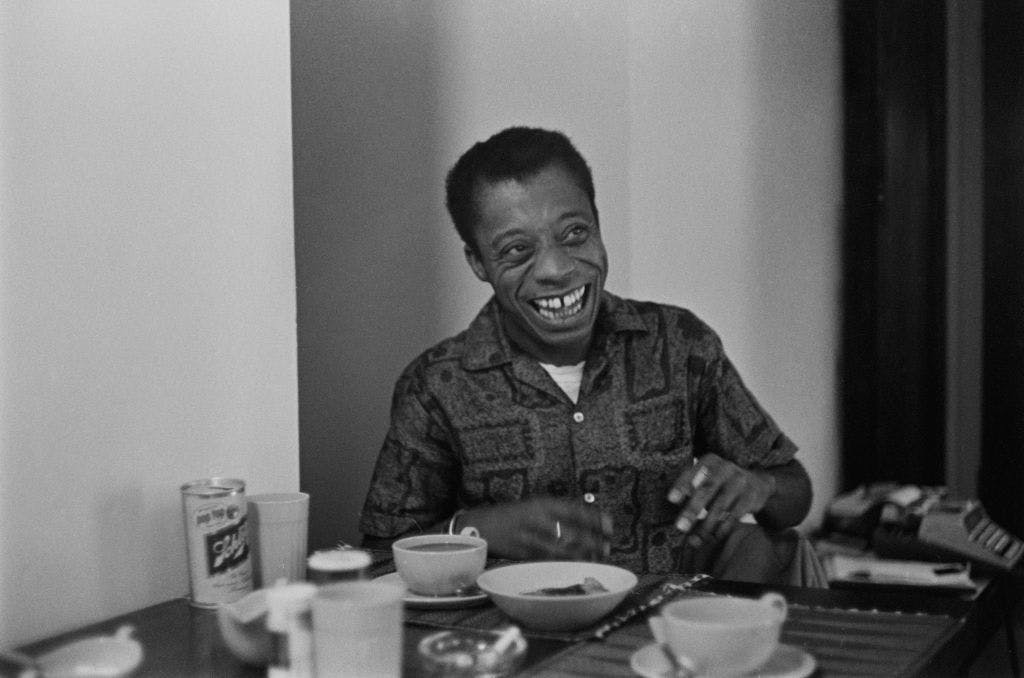James Baldwin and the Burning Issue of Race
The biography is especially adept at showing how the eloquent, assured Baldwin privately shared the agonies and fears of the major public figures he took on for their retrograde views of race, such as William Faulkner.

“James Baldwin: Living in Fire’
By Bill V. Mullen
Pluto Press, 272 pages
Now in paperback, Bill V. Mullen’s biography of James Baldwin received excellent reviews when it first appeared in 2019 — “fresh,” “scrupulous,” and “incisive” are typical of the adjectives that have been used in blurbs.
It takes nothing away from even the best-received biographies to identify what they leave out, and what other biographies of the same subject may put back in — not only to provide a different assessment of the subject, but to do a service to biography itself as a form of knowledge that is constantly growing.
Mr. Mullen’s biography is especially adept at showing how the eloquent, assured Baldwin, who took on major public figures like William Faulkner for their retrograde views of race, in private shared many of the same agonies and fears that Faulkner experienced, though Mr. Mullen understandably does not explore Faulkner’s feelings.
Baldwin was incensed after reading an interview in which Faulkner declared, as Mr. Mullen puts it, that “if it came to a contest between the state of Mississippi and the federal government he would fight for Mississippi, ‘even if it meant going out into the streets and shooting Negroes.’”
Faulkner repudiated the reprehensible remark, claiming no sane man could say such a thing, but the damage had been done and Baldwin flayed Faulkner for his “go slow” approach on civil rights. Baldwin believed, in Mr. Mullen’s words, that southern segregation had “allowed white people, with scarcely any pangs of conscience whatever, to create, in every generation, only the Negro they wished to see.”
Behind the scenes, though, Mr. Mullen observes that the ferociously uncompromising Baldwin disclosed in letters an “almost lethal psychological vulnerability regarding besieged black southerners facing down white politicians, banks, juries, police, and media.” Staying in one of the few Black-owned hotels of Birmingham, Alabama, Baldwin found what Mr. Mullen calls a “refuge” from “reactions symptomatic of hysteria barely controlled: always on the edge of tears; can’t sleep.” Birmingham, Baldwin dreaded, was a “city which is busy preparing its doom.”
What strikes this biographer of Faulkner is that he felt the same way as Baldwin. Faulkner was getting death threats for his support of integration, and friends like a Mississippi historian, Jim Silver, advised him to carry a gun, as Silver, an outspoken liberal, did. Faulkner refused to do so, but pressured by a staunchly segregationist family and community, he felt as hysterical as Baldwin, and so he had his terrible moment of recidivism, proclaiming his loyalty to Mississippi.
That conflicted Faulkner is nowhere to be found in Mr. Mullen’s book, and that is not the author’s fault, since his purpose is to understand the life and times and psychology of James Baldwin, and not to offer an empathetic portrayal of William Faulkner.
When the heat of Mississippi became intolerable, Faulkner traveled — often to Europe — so that he could, like Baldwin, bask in the admiration of those who treated him as a writer of great importance and only secondarily, if at all, as the product of a particular culture and the focal point of political conflict.
As Mr. Mullen reports, Baldwin had traveled to America because he was “tired” of France’s traumatic involvement in the Algerian war. Like Faulkner, Baldwin was at a stage in his career when it was becoming increasingly difficult to separate himself and his writing from his controversial position as a public figure.
Baldwin, writing to a friend, prophesied a grim future for his reputation as a writer: “Well some year from now some bright, untroubled cipher, who is even now throwing practice rocks, will begin his dissertation on Baldwin thus: ‘Around the age of thirty-five, Baldwin underwent an artistic and racial crisis and began to hate everyone, and took the first great strides towards becoming that monster whose name is now anathema before.’”
Baldwin might just as well have been speaking for Faulkner, who to some has become a problematic figure, if not worse. Mr. Mullen calls Baldwin’s prophecy “a bit of dark but revealing self-parody.” It seems more than that to me. If the public burning of Baldwin has not happened yet, who is to say that at some future date it won’t?
Mr. Rollyson is the author of “William Faulkner Day by Day.”

